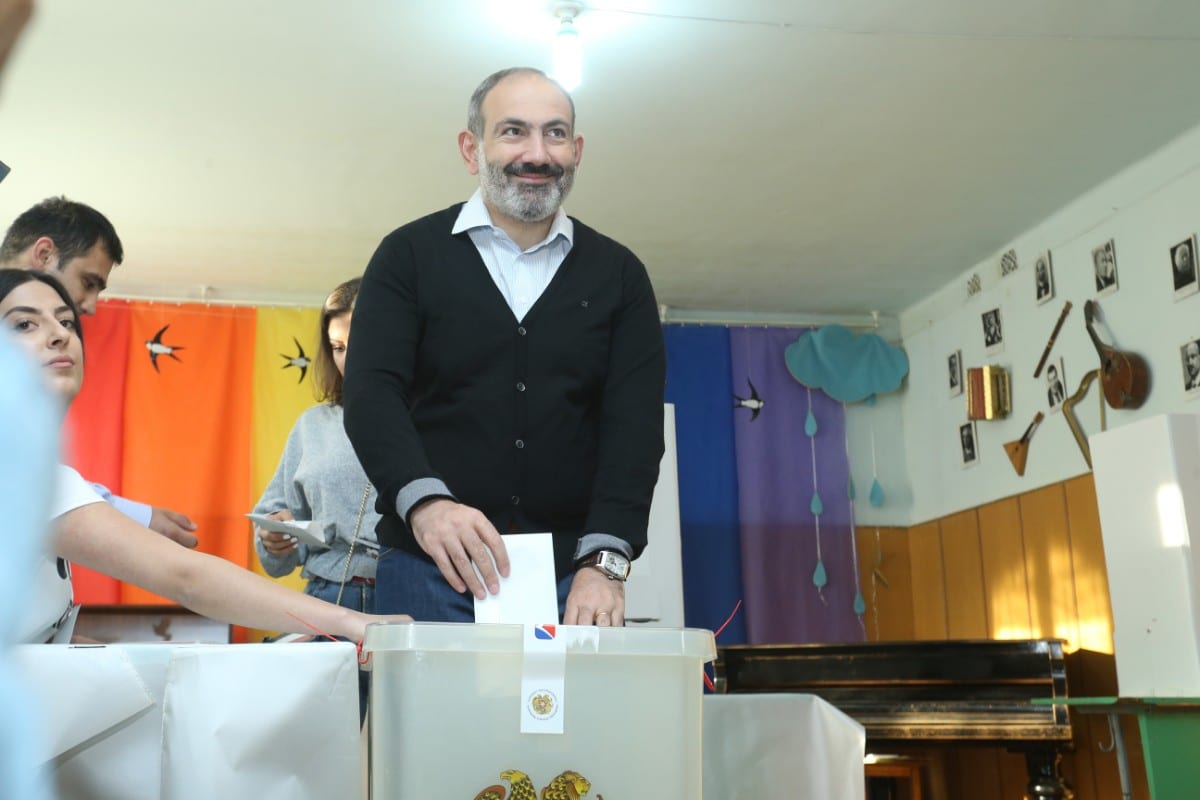 Courtesy: Armenian Government
Courtesy: Armenian Government
Why Armenia Will Remain in Russia’s Sphere of Influence After its Snap Elections
On October 16, Armenian Prime Minister Nikol Pashinyan announced his resignation on live television—a move intended to trigger snap parliamentary elections. This makes us wonder what changes Armenia will undertake and if they will impact the country’s relationship with Russia. Pashinyan’s move is seen by the opposition as a way for the Prime Minister to consolidate a political monopoly in Armenia’s government. If Pashinyan were to gain a majority in Armenia’s parliament, he would have the capability to implement serious changes to Armenian policy. For now, Moscow’s silence over Pashinyan’s move mirrors their response to his rise to power.
Earlier in September, Pashinyan’s “My Step” bloc won Yerevan’s municipal elections with over 80% of the vote despite a low turnout. The election solidified Pashinyan’s status as a political force with widespread popularity in Armenian politics. Yesterday, the Yelk Alliance nominated Pashinyan as Prime Minister. According to news sources from Moscow, Pashinyan is set to be the sole candidate running for the post. Judging from the pattern of these events, Pashinyan will certainly be approved as Prime Minister and his My Step bloc will constitute a new majority in Armenia’s parliament. However, when it comes to Armenia’s foreign policy, the new political elite will not pose a threat to Moscow’s influence in the country. The small nation will remain in Russia’s sphere of influence after its snap elections for the following reasons:
- Pashinyan and his coalition remain silent regarding Russia and Armenian-Russo relations.
Despite contradictions within official and unofficial reports about a new dynamic between Moscow and Yerevan, there have been no comments from Pashinyan on changing the state of Armenian-Russo relations through Armenian parliamentary elections. Instead, Russian news media reported Pashinyan commented on a mutual atmosphere of trust with President Vladimir Putin and their personal relationship. Before this, Pashinyan also formally extended his congratulations to Putin on his birthday and added how he appreciated the strengthening of Armenia-Russo relations.
- Pashinyan’s change in stance over pulling out of the Eurasian Economic Union will likely transfer to his “My Step” bloc.
Prime Minister Nikol Pashinyan belongs to the Civil Contract Party which participates alone or makes political coalitions with other political parties or nonparty candidates to form a voting bloc. During 2017, Civil Contract formed part of the Yelk opposition block which opposed Armenia’s ascension into the Eurasian Economic Union. Ever since the Velvet Revolution, Pashinyan has distanced himself from this narrative. He has also not mentioned any plans to withdraw Armenia from the Eurasian Union. While Pashinyan indeed expressed support for a Comprehensive and Enhanced Partnership Agreement with the EU, this agreement would not limit Armenia’s participation in the Eurasian Union.
Pashninyan is currently in a position of strength; he is Armenia’s most popular politician. Thus, he sets the political agenda for Civil Contract, his own political party, and is unwilling to make compromises with those unwilling to support his political agenda. Because of this popularity, the positions of his party will become synonymous with his positions. As a result, his softened rhetoric on the Eurasian Union will transfer to his “My Step” bloc.
- The Nagorno-Karabakh Conflict is still a force to be reckoned with.
The Nagorno-Karabakh conflict plays large role in Armenian politics and consciousness. Pashinyan’s predecessor, Serzh Sargsyan accused Azerbaijan of Armenophobia and made Nagorno-Karabakh a cornerstone of his electoral campaign. Ever since Pashinyan took his place in May, he strengthened his position on the subject. Just last month, Pashinyan declared in the United Nations that Karabakh must not be part of Azerbaijan and suggested Azerbaijan’s claim could trigger a new genocide of the Armenian people.
Despite a revolution, Armenia has made no significant foreign policy changes regarding this issue. Armenia is highly reliant on Russia for defense and deterrence issues, and the prioritization of Nagorno-Karabakh leaves Armenia closer to Russia by default.
In conclusion, Armenia has broken the mold in the post-soviet space with a peaceful revolution that may just succeed in breaking free from the “Old Guard.” However, Armenia will continue to remain in Russia’s sphere of influence and fail to pose serious threats to Russia’s policies in the region.





